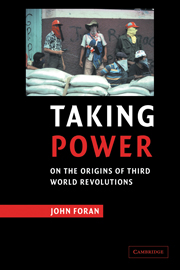6 - The past and future of revolutions
Published online by Cambridge University Press: 22 September 2009
Summary
The duty we owe history is to rewrite it.
Oscar WildeThe twentieth century we have so recently departed has surely been one of the great ages of revolutions, in Skocpol's sense of “rapid, basic transformations of a society's state and class structures … accompanied and in part carried through by class-based revolts from below.” From the events of 1917 in Russia that so profoundly shook the world, to the great Third World social revolutions in China, Cuba, and Nicaragua (and the lesser ones – in transformational terms – in Mexico and Iran) and the anticolonial revolutions in Algeria, Vietnam and southern Africa; from the shorter-lived but no less remarkable democratic revolutions in May 1968 in France, Chile under Allende, and Manley's Jamaica, and the more enduring “velvet” revolutions of 1989 in Eastern Europe, to the current struggle in Chiapas, the historical record is rich in dramatic experiences of ordinary people undertaking extraordinary collective acts.
This book has surveyed this epoch of revolutions, and it is time to draw up a balance sheet and look ahead to the future of revolutions in a new age of globalization. This chapter, then, provides an overview of the findings of our study, a look at the unsettled present, a glimpse into the revolutionary future, and ends with some thoughts on what scholars and activists might want to take with them to the social transformations that surely lie ahead.
- Type
- Chapter
- Information
- Taking PowerOn the Origins of Third World Revolutions, pp. 247 - 278Publisher: Cambridge University PressPrint publication year: 2005



